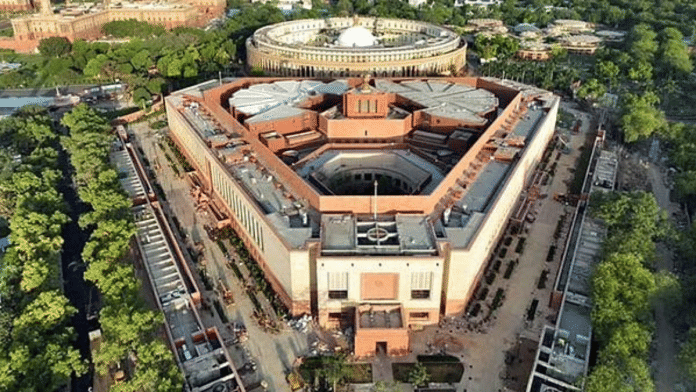Thank you dear subscribers, we are overwhelmed with your response.
Your Turn is a unique section from ThePrint featuring points of view from its subscribers. If you are a subscriber, have a point of view, please send it to us. If not, do subscribe here: https://theprint.in/subscribe/
The 2025 Monsoon Session of Parliament was anything but routine. The session witnessed huge walkouts, debate on national security, and a surprise apology made on the floor of the House, more akin to an expertly staged political drama—where all played in front of a critical national audience.
It began in chaos, found brief moments of consensus, and ultimately centred around Operation Sindoor, India’s military response to a major terror attack. While legislative business remained sluggish, the political messaging was sharp, and the underlying themes of national security, narrative control, and institutional trust came into stark focus.
Parliament of India| Image source- Newsx
Act I: Protest, paralysis & reluctant truce
The session commenced on 21 July, and immediately, the Opposition led by the Congress, TMC, and DMK staged repeated protests in both Lok Sabha and Rajya Sabha over the government’s handling of the Pahalgam terror attack of April 2025, in which 26 civilians were killed.
The demand was straightforward: a structured debate on national security and the chain of events that led to Operation Sindoor, India’s retaliatory military action. But for nearly a week, the government delayed, leading to repeated adjournments and an unproductive start.
It was only after the all-party meeting—when BJP’s Kiren Rijiju sat down with Rahul Gandhi and Mallikarjun Kharge—that the logjam started to clear. The government agreed to hold an open discussion on Operation Sindoor, and the Houses resumed normal business.
Act II: The Sindoor spotlight
The centrepiece of the session was undoubtedly the extended debate on Operation Sindoor, India’s swift military response to the Pahalgam attack. According to Defence Minister Rajnath Singh, Indian forces acted within 22 minutes, striking terror infrastructure in Bahawalpur and Muridke using domestically built drones and cruise missiles.
External Affairs Minister S. Jaishankar reinforced this position in the Rajya Sabha, stating unequivocally that no call took place between PM Modi and Donald Trump, who had publicly claimed he helped broker a ceasefire. “The world must show zero tolerance for terrorism”, Jaishankar said, in a remark that was both a statement of policy and a subtle jibe.
Modi vs Rahul: The parliamentary duel
Prime Minister Narendra Modi addressed the Lok Sabha with his trademark rhetorical flourish. He framed Operation Sindoor as a historic step in asserting India’s sovereign right to retaliate, and sharply criticised Congress for echoing Pakistan’s talking points. He also cited the Indus Waters Treaty, suggesting that it was past Congress governments that weakened India’s strategic position.
PM Modi in Lok Sabha| Image Source-Sansad Tv
Rahul Gandhi responded with a composed but pointed critique. While he lauded the armed forces, he questioned whether the government had intelligence lapses leading up to the attack and why India had allowed foreign leaders like Trump to dominate the global conversation on the conflict. “A tiger has to be given freedom. You cannot control a tiger if you need your work done,” said Gandhi highlighting – political will and freedom of operation.
Tensions & apologies in Rajya Sabha
The Rajya Sabha debate brought its own fireworks. When BJP leader JP Nadda made remarks perceived as personal attacks on Leader of the Opposition Mallikarjun Kharge, a heated uproar followed. In a rare gesture, Nadda apologised and formally withdrew his comments, de-escalating tensions momentarily.
Elsewhere, a language dispute flared when BJP MP Nishikant Dubey addressed the House in Hindi, prompting protests from Tamil Nadu MPs demanding he switch to English. The Speaker intervened, reminding members that both Hindi and English are constitutionally valid for parliamentary proceedings.
TMC raises questions on strategy & perception
Trinamool Congress MPs expressed sweeping strategic fears. They endorsed the military operation, but they criticized the government for its shortcomings in articulating international opinion. They contended that Trump’s constant assertions of taking the role of a mediator in the war overshadowed India’s story.
They demanded for transparency on why the Pahalgam attack occurred in the first place and called for more internal security and coordination of intelligence.
Where’s the legislation?
The political heat has so far eclipsed the session’s legislative agenda. As of 30 July, no significant new bills had been introduced or passed. Government sources have indicated that economic and digital governance bills may be tabled in the coming week, but the focus so far has remained firmly on national security and political messaging.
The Bigger Picture
The Monsoon Session has seen more political theatre than policymaking. While the government projected strength through swift responses, the Opposition focused on transparency and accountability. Despite disruptions, this rare blend of confrontation and cooperation has set the tone for an intense political season ahead.
These pieces are being published as they have been received – they have not been edited/fact-checked by ThePrint.


